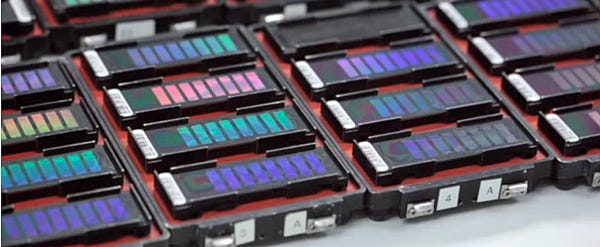FDA Warming Up to DNA Tests for the Masses
February 20, 2015
FDA appears to be offering a path forward for companies such as 23andMe that want to market medical-related genetic tests directly to the mass public.
Nancy Crotti
|
23andMe's unique DNA genotyping chips, as shown in a company video. |
The standoff between 23andMe and FDA is showing signs of easing, with the agency clearing the Mountain View, CA-based genetic testing company to market a test for a rare disorder that causes short stature, sun-sensitive skin changes, and an increased risk of cancer.
The de novo clearance of the test for Bloom syndrome marks the first time FDA has approved a "direct-to-consumer" genetic test. Bloom syndrome ismore common in people of central and eastern European Jewish descent, affecting about 1 in 50,000. Parents would have good reason to want to know whether they are gene carriers: on average, Bloom syndrome sufferers don't live past 30.
On top of the clearance for 23andMe, FDA also said that it would classify such autosomal-recessive, carrier-screening tests as Class II devices, making them available to consumers without agency review. Itplans to issue a notice to that effect with a 30-day period for public comment.
The government's decisions mark a double victory for 23andMe, which is backed by Facebook and Google. FDA banned 23andMe from selling its $99 Personal Genomic Service tests to consumers in 2013 due to a lack of scientific evidence.
"While this authorization is for a single carrier status test only, we are committed to providing US customers with health information once more tests have been through this process and we have a more comprehensive product offering," 23andMe CEO Anne Wojcicki wrote in a blog post. "Because this process was successful, we may be able to submit some future submissions through the standard 510(k) pathway," Wojcicki wrote in a separate post.
The company performed two studies that FDA said showed equivalent results in detecting carrier status of Bloom syndrome. The company also conducted studies to demonstrate that consumers could understand its saliva collection test instructions and collect an adequate saliva sample, the agency said.
Wojcicki founded 23andMe in 2006. The company has collected samples from 800,000, according to a report in Forbes.
Despite FDA clearance, 23andMe said it will not make any health reports, including Bloom syndrome test results, available to customers "until we have a more comprehensive health product offering."
FDA will require the company to explain in test package labeling what the results might mean for prospective parents. If the test is sold over the counter, FDA will require 23andMe to provide consumer information about how to obtain genetic counseling before and after performing the test for Bloom syndrome.
Mutations in the BLM gene cause the syndrome, according to the National Institutes of Health. The BLM gene provides instructions for making RecQ helicases, enzymes that bind to DNA and temporarily unwind its double helix. This unwinding is necessary for replicating DNA in preparation for cell division, and for repairing damaged DNA. BLM gene mutations prevent the BLM protein from performing its function in maintaining genomic stability, the NIH said.
Refresh your medical device industry knowledge at BIOMEDevice Boston, May 6-7, 2015. |
Nancy Crotti is a contributor to Qmed and MPMN.
Like what you're reading? Subscribe to our daily e-newsletter.
About the Author(s)
You May Also Like



